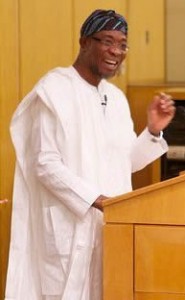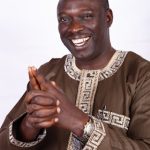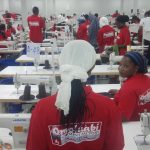
AREGBESOLA THIRD ANNIVERSARY: By Innovation, Harvests Increase

The Director, Osun State Bureau of Communication and Strategy, Mr Semiu Okanlawon, highlights the achievements of the Aregbesola Administration in the last three years.
By November 2010 when the administration of Ogbeni Rauf Aregbesola took over the baton, Osun was barely a year less than two decades. What the entire state could boast of in internally generated revenue (IGR) in almost twenty years was no more than N300 million every month at the very highest. Records indicate it fell short of that many times.
However, by November 2013, a period of three years, by merely blocking all the leakages, Osun now rakes in N1.6bn in IGR monthly without expanding the tax net and the prospects are high and encouraging. What this indicates in clear terms, is that in all of its 19 years of existence as a state before the advent of the Aregbesola administration, Osun could muster a paltry N300million in what its people could contribute for its survival and continued existence. Conversely, in three years, the state grew its IGR by 433 percent.
Glimpsed from the perspective of this phenomenal growth, Nigerians are wont to go back to such statistics from the National Bureau of Statistics in terms of development indices to reason why Osun shows the highest capacity for outstanding growth in the whole country at the moment despite the unenviable 34th place in the revenue allocation ladder and meagre opportunities to generate funds internally.
The National Bureau of Statistics announced to the world that Osun ranks highest in public school enrolment in the country in a national environment where public school enrolment figures make very loud statements of the rot in the country’s education sector.
Within the same period and owing to the same factors, the National Bureau of Statistics placed Osun in the league of states with the lowest unemployment rate with the lowest figure of 3.0 where even Kwara ranks 7.1, Lagos ranks 8.3 and Oyo 8.9.
Of course, the obviously low crime rate in the state did not elude the observation of Participants of the Course 22 of the National War College Abuja which spent some days in the state on an assessment tour within the last two months.
All these indications of success cannot be happenstance. If anything, they represent the direct outcomes of ingenious, coordinated and determined interventions in the affairs of a state that was brought to its knees in all spheres of life.
Declaring that “For me and for all of us, it is work, work and more work!” on the day of his inauguration at the state capital, Osogbo on November 26, 2010, Governor Aregbesola left no one in doubt on the direction his administration was to follow more so with the resolve to run an unusual government.
He seemed to have read Alfred North Whitehead well. Whitehead’s logic that “simple solutions seldom are,” and that “it takes a very unusual mind to undertake analysis of the obvious” readily provides the only template for any critical mind to analyse the problem-solving fervor of the governor.
The state with a population of about 3.8 million people had its difficulties spelt out in all the areas. The education sector presented a depressing outlook. Schools did not promise learning. Hospitals did not promise health. Roads did not promise safe journeys. Markets did not promise sales. Farms did not promise food. But even in the face of these, the people had resigned to fate; having been cowed into silence and trepidation by the combined evil forces of foisted poverty and festering violence.
But realising that “fear is the lack of faith in one’s ability to create powerful solutions,” as reasoned by T.F. Hodge in his From Within I Rise: Spiritual Triumph Over Death and Conscious Encounters with “The Divine Presence”, what have emerged in the last three years in Osun represent “powerful solutions” to break the shackles of poverty and set the people on a path to greatness.
The distinct admission, that the same old solutions cannot continue to be applied to the same old problems, have culminated in ground-breaking ideas that have only placed the state steps ahead of its peers.
The youth employment strategies employed by the government have proved to be not only ingenious but efficacious. Forty thousand youths engaged through the Youth Empowerment scheme and its allied forms are the reasons for such commendations by the World Bank, National War College Course 22 Participants, American embassy, the Sultan of Sokoto, Speaker Aminu Tambuwal, and a host of others who have seen that something unique is taking place in Osun beyond the ordinary.
In a country with mounting restiveness in all her regional parts, the Osun job creation specimen provides development experts fresh vistas of ideas to solve not only Nigeria’s but Africa’s bourgeoning unemployment predicament. That the World Bank adapted this model and presented it to the Federal Government culminating in the Youth Employment Social Support Operations, YESSO speaks volume about the Osun’s now established thinking out of the box.
Yes! The reforms in the education sector have brought about hoopla. But that is only to the very extent that humans must naturally resist change even when they are to transit from hell to paradise. This is coupled with the fact that the ever-opportunistic opposition camp, boxed to a corner and dazed by the chains of innovative projects, is poised to confuse the citizens with its dubious manipulative characterization.
Ranking Opon Imo, the Tablet of Knowledge among four best global learning tools by the United Nations-backed World Summit Award Global Congress strengthens the claim that from Osun has emerged “powerful solutions” to the problem facing quality education.
A combination of uninspiring learning environments, ill-motivated and unqualified teaching personnel, inadequately prepared curriculum and other problems had all conspired against quality learning.
If governance means responsibility to the people at all, the solutions proffered have addressed the roots of failure and ignited fresh passion for learning. The years to come are to confirm the ingenuity that lies in the solutions as examinations results are already indicating that the rot is disappearing.
The Senate Committee on Education, led by Senator Uche Chukwumerije, did not just recommend the Osun education model for the entire country for nothing. There is no argument about the fact that Nigeria has lost its grip on the education sector with the concomitant huge costs to progress, order and development.
A large illiterate population readily promotes poverty, diseases, stagnation and violence. The Senate’s assessment of the Osun model and subsequent recommendations for national acceptance and adoption as a way out of the present conundrum is a powerful endorsement of the creative governance in the state.
The creativity resonates in tourism to attract people to Osun; it resonates in agriculture to cause massive food production; in youths engagements to re-orientate youth and create the new total man who is useful to his society. In environmental cares, the government has demonstrated a rare foresight in the management of its affairs that a hitherto uninspiring environment now greens with order and coordination.
It is also on record that this foresight made the state to stay afloat when many states of the federation came under the mercy of massive floods; a national catastrophe that had forced the Federal Government to belatedly spend billions of Naira to limit loses of lives and properties. Just before the current administration took over, it was tragedy galore as flood swept humans and goods away even before the very eyes of those who had no solutions to society’s pressing problems.
The innovative nature of the solutions always provided is the very reason for the noise. But there has emerged a pattern. Virtually all innovative ideas that had ignited heated debate and hullaballoo have been embraced surprisingly by their initial vociferous critics.
What other states of the federation and the Federal Government have done with the youth engagement strategies, re-branding of the state, and others have merely shown that it is a matter of time for the education reforms models, projects financing strategies and others to be adopted as indispensable options for rapid growth.
Of course, some have accused the administration of obduracy; castigating it for sticking to its ideas of development even in the face of mounting criticisms.
But the driver behind the wheel, just like the American inventor and businessman of the 19th century, Nathaniel Jarvis Wyeth, says, “I’m convinced that the best solutions are often the ones that are counterintuitive – that challenge conventional thinking – and end in breakthroughs.
“It is always easier to do things the same old way…why change? To fight this, keep your dissatisfaction index high and break with tradition. Don’t be too quick to accept the way things are being done. Question whether there’s a better way. Very often you will find that once you make this break from the usual way – and incidentally, this is probably the hardest thing to do—and start on a new track, your horizon of new thoughts immediately broadens. New ideas flow in like water. Always keep your interests broad – don’t let your mind be stunted by a limited view.”
THE NATION



